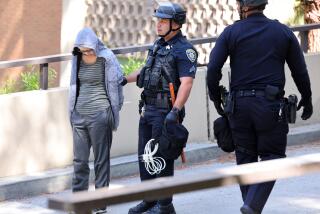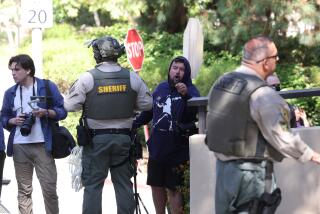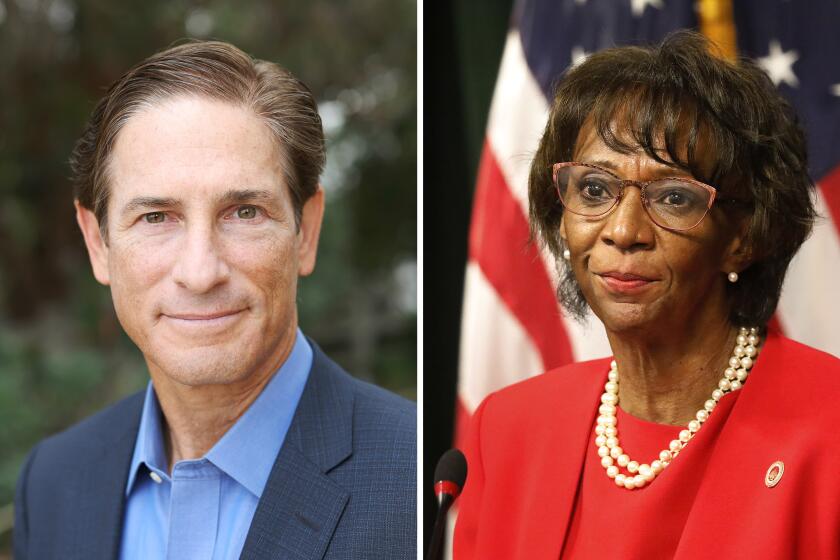Southland Muslims Mark End of Ramadan
In a pious conclusion to a month of fasting and self-discipline, an ethnic rainbow of Southern California Muslims on Sunday prayed and celebrated the end of Ramadan at the Anaheim Convention Center.
Some 10,000 Muslims from the West, Africa, the Middle East and Asia--many in the clothing of their homelands--gathered for the 8:30 a.m. service, which was led by Imam Dr. Muzammil H. Siddiqi, the religious director of the Islamic Society of Orange County in Garden Grove, California’s largest mosque.
“Today, we have the feeling of joy and satisfaction,” Siddiqi said in his sermon, “and the feeling of brotherhood and sisterhood and solidarity with ourselves. We are the people of the faith. We set aside all the things of races and language that divide us. We do it in the name of Allah.”
Facing east toward Mecca, those assembled touched their heads to the ground four times in a gesture of submission and humility, while Siddiqi intoned Allah Akbar--God is great.
The holiday, which is called Eid ul-Fitr--the Festival of the Breaking of the Fast--is a time for families and friends to gather and share a meal or to make a phone call across the country or to the other side of the globe.
“Today is a good day to see friends,” said Aiyub Palmer, a UCLA student in Arabic who lives in Garden Grove. “Fasting has been a collective effort. There is a bond that is made between us and you have a rapport because of what you have been through and it creates a unity, a sense of community.”
The faithful who gathered in Anaheim turned a huge hall at the Convention Center into a momentary mosque, preparing for worship by spreading sheets and blankets and personal prayer rugs on the ground in neat rows.
Thousands of families and individuals streamed into the building, putting donations for Ramadan into boxes, then separated themselves by gender, with “sisters” heeding signs directing them to the back of the hall and “brothers” gathering in front.
Elsewhere, there were mass ceremonies in Pomona at the Los Angeles County Fairgrounds and at the Los Angeles Convention Center, as well as at mosques around the state, officials said.
“It is important for us to come together and see the different faces of Islam, to see the spectrum of people who are practicing the faith,” said Aaiysha Khursheed, whose family comes from India and now worships at the Garden Grove mosque.
There are about 150,000 Muslims in Orange County and 1 million in California, with a majority of those in Southern California, said Shabbir Mansuri, founding director of the Council on Islamic Education in Fountain Valley.
“We are the largest faith in the world,” he said, with 1.3 billion adherents. “Our roots are the same as yours.”
“The spiritual aspect of this holiday, the fasting, is to remember God and his mercy,” said Mansuri. “Christians, Jews and Muslims all believe in the story of Abraham, which is about a belief in the oneness of God and the obedience to one God.”
The faithful worshiped in bare feet or socks, shoes put aside during prayer to signify leaving behind the worldly and because they come into contact with dirt, he said.
The ceremony was moved indoors from Mile Square Regional Park in Fountain Valley because of the threat of rain, and during a portion of the service, when thousands contemplated quietly, the silence was broken only by the cries of infants from the back of the hall or the building’s mechanical hum.
Some prayed with eyes shut in concentration, women with shawls on their heads and many men wearing Khufis, Islamic head coverings. When the service concluded, there was a round of hugs and cheek bussings, the traditional exchange of greetings called Eid Mubarak, which means holiday blessings.
The monthlong fast involves abstaining during the daylight hours from food, water and “lower desires,” said Aqil Rajput of San Clemente, who at the end of the service went forward with his sons and several hundred others to share Eid Mubarak with the imam.
“Food and sex are needs of the body that are imposed on the mind,” he explained. “The mind needs to be apart from that during Ramadan.”
Siddiqi explained that the fast teaches self-control and “is a training period.”
“What you learn is the ability to discipline [yourself], to know when to say no,” he said. “You learn how to control yourself about things that are accessible and permissible, so you can control yourself for things that are not permissible.”
More to Read
Start your day right
Sign up for Essential California for news, features and recommendations from the L.A. Times and beyond in your inbox six days a week.
You may occasionally receive promotional content from the Los Angeles Times.





